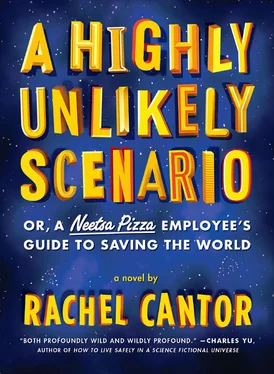We need to know what’s here, for security’s sake, Leonard said.
Sally couldn’t argue with that, though she probably knew that Leonard was merely curious — about those alcoves over there, and what those people were doing over there and there.
I’ll come with you, she said. If I don’t, you’ll lose me and never find me again.
They walked down the aisle that separated the main hall from the outer aisle, thus observing but not participating in the chaos around the alcoves, where the infirm, crippled, and aged discovered new vitality, pushing and shoving and maneuvering with sharp elbows, as did relatives holding stretchers. Others sang boisterously in huddled candlelit circles or read loudly from little books; a few twitched and jerked as if possessed. On the floor and on the walls by the alcoves, Leonard saw the small objects they’d earlier seen for sale — a horse, a chain, a ship — as well as tiny paintings of little pilgrims, their palms pressed together in front of their faces — forgotten, probably, by pilgrims exhausted by their quest.
Crammed between the alcoves were stone figures sleeping on stone boxes — tombs, he heard a guide explain to six red-haired Swabians, and the alcoves were shrines, and the glittering pictures made from colored bits were mosaics. The stone figures were enthusiastically embraced by pilgrims; an old man lay outstretched on one, snoring.
What is that tall lady doing? Sally whispered.
She seems to be sweeping dust from a tomb into a travel pocket.
Can’t be.
Leonard had to agree: it couldn’t.
Between the shrines and tombs, the walls were covered by richly brocaded throw-cloths, and multicolored orbs tinkled mysteriously against one another; they appeared suspended in air, though in fact they hung from candleholders by tendrils of nearly invisible metal threading.
Why do you like this? Sally asked. I thought you liked your White Room. This is nothing like a White Room.
I did, Leonard said. Maybe because I didn’t know places like this existed. Look! he said, and pointed at a brazen figure of a seated man holding a key. Pilgrims were queuing to talk to this figure and to kiss its shiny toe.
Milione was right, he said. The world is full of wonders. You have only to look and pay attention.
Milione?
Another long story.
I’m tired of your long stories.
I’ll tell you everything when I can, Leonard said.
I’m tired of everything, Sally said. I didn’t nap this afternoon like you did, you know.
We’ll rest soon.
Do you think we’re safe? Sally asked.
I’m sure of it.
Will you look for signs and wonders, just to be sure?
Leonard put his arm around Sally’s shoulder but was tsk-tsked by a nun in a sweeping gray habit.
The strangeness and wonder of the world
And so they circled the great hall, which was actually transected at the far end by a shorter hall, Sally looking over her shoulder all the while for the man with the loud boots or the Frankish woman who thought they were evil, while Leonard marveled at the gilded candle-holding devices that hung ingeniously from the ceiling.
Leonard counted one hundred columns: eighty-eight in four rows separating the central hall from the four outer aisles, plus an additional twelve around the area where the two halls intersected. Again, he approved the decision, one hundred being ten squared, ten being the tetractys, or sum of the only numbers needed to geometrically define known objects (which is to say 1 + 2 + 3 + 4), but he found perplexing the variety of columns, which were not of uniform size or shape: the two in the front were black, for example, which anyone should know was a mistake.
When they finally returned to their corner, Sally said, Keep looking for signs and wonders, then fell promptly asleep on his shoulder.
Leonard closed his eyes and took a deep breath, and then another, then maybe twenty more, and felt the strangeness and wonder of the world breathing through him in one great circular breath. He remembered Mill’s words — you have only to pay attention, to give yourself over to wonder — then opened his eyes and saw, with exquisite precision, clear at the other end of the hall, on a triumphal arch, a mosaic — a mosaic of the building itself, being offered to a scruffy man on a throne, and inside that building, a mosaic of the mosaic within the building, being offered to a man on a throne, and in that mosaic of the building, a mosaic of the building, and so on. All possible mosaics of the building locked into place, and Leonard saw them as if they were one cubit before him, their infinite edges sharp and clear. He looked away and saw the bloody bandage around a pilgrim’s head across the basilica; he smelled the man’s fear. He closed his eyes and smelled a hundred smells, each of them distinct: incense coiling from every shrine, the smell of the unwashed, every pilgrim with his or her particular scent, the odor of fish dinners, a dozen species of fish cooked according to the customs of a dozen lands. He heard a cacophony of languages; the shriekings and cryings, in all their echoing discord and variety, were as stirring and majestic as the NP theme song. He felt the innumerable gradations of cool marble against his back, and the pressure of Sally’s head against his shoulder: sweet Sally!
The world, he murmured, is so beautiful.
Soon it will be no more, a voice said.
Leonard opened his eyes, slowly. A freakishly tall man, bearded and not wholly substantial, hovered before him, his slippered feet not quite touching the ground. He had a pronounced gap between his smiling teeth and was juggling Hebrew letters in the air.
Okay, bye!
How’s Felix? Leonard asked. He may have been speaking out loud, it was hard to know.
You understand much, the floating man said. Meditation, extratemporal transportation, fasting …
We don’t have much food, Leonard admitted. Are you Isaac or Abulafia? he asked.
The man looked hurt.
I am Abulafia, the Messiah. Moshiach? he added when Leonard’s face remained blank. The anointed one? Descendant of David? Messenger of peace?
Oh, Leonard said. He wanted to wake Sally — she should see this! — but he no longer felt the weight of her head upon his shoulder — he no longer felt even his shoulder, or his hand, or the marble wall against his back. He wasn’t even sure he was breathing.
You’re talking kinda normally, he said. Doesn’t Isaac translate for you?
Feh! Abulafia said, offended anew. He continued to juggle: an improbable number of letters swirled above his head in complex loops and folderols.
Is Felix okay?
His name is Asher now, and he is fine. I am helping him, he is helping me. You can go home now. Bye! and the man and his swirling letters started to fade away.
I can’t leave just yet, Leonard said, and the man returned. I have to see Felix. I have to take him home.
Oh, no. Sorry, the man said, looking up to where he executed a double roundabout juggle that caused the letters to circle each other in both backward and forward motion. That won’t be possible. I need him. Big shame! I would have liked to have talked with you about Pythagoras. I met him once, you know, in Tibet. Wonderful man! But now it’s time for you to go. Cheerio! and again the man started to fade.
You can’t keep him! Leonard said. He’s needed at home, we need him at home. He froze the world, you know.
The man returned to focus, looking a trifle put out. His juggle was simple now: just four simultaneous circlings.
It doesn’t matter. The world’s going to end, Felix will help me. It’s a two-man job. So take care now, you hear!
He has to come home.
The spirit-man floated closer, perhaps to impress Leonard with his prodigious height. The letters left his hands and rose to the timbered ceiling, there to loop and spin.
Читать дальше












